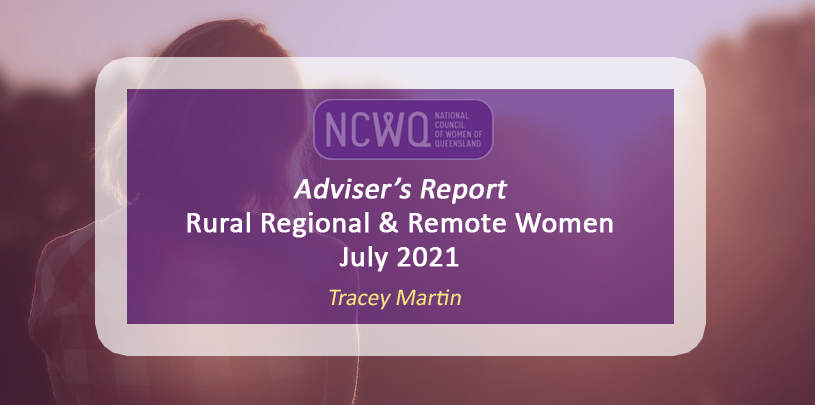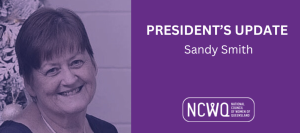By Tracey Martin, NCWQ Rural Regional and Remote Women Adviser
Social Isolation
Domestic Abuse can be exacerbated in rural areas with coercive, financial and emotional abuse thriving in social isolation. Rural and remote women should be recognised as a high ‘at risk’ group across all form of domestic violence and abuse, due to the enhanced risk and limited access to support services due to distance. Tailored solutions developed and co-designed in rural and remote communities that support the victims, and their ongoing employment and child schooling are needed. These services need to be delivered in a way that reaches the women. Existing counselling online and/or telephone services of support need to be further strengthened with technical and hardware support made available if required. Local service providers need to be educated about the heightened risks of social isolation and their professional duty should include inquiring about the mental health wellbeing, safety and support being utilised by people suffering social isolation. Also there needs to be follow up by mental health services across at-risk communities including rural and remote women and their families.
GPs and emergency services staff and nurses should be educated to the indicators and risk associated with rural and remote women seeking support and intervention to address social isolation for themselves and their families, when fleeing domestic violence and other forms of abuse and ensure those health care service providers have strategies to offer and a follow up mechanism for these women. They need to understand what a rural and remote woman suffering financial abuse, leaving a perpetrator, and travelling for two days across the State, looks like when she attends an emergency department at 2 am asking for assistance with a sick child, suffering from exhaustion whilst alone and in transit fleeing abuse during lockdown. These indicators are being missed by primary health care providers with criticism levelled at the mother for seeking assistance at 2:00am. Fleeing domestic abuse during lock-down is one of the exemptions to travel – this needs to be taught and highlighted with support offered by emergency services. Reporting should be mandatory.
Suitability and availability of professional services is another issue. Government must work with the professional services associations in the legal, financial planning and accounting professions to implement and strengthen their ethical standards when advising clients. Clear documentation of the circumstances of all affected parties together with a mandatory written warnings should be given to clients (not just the paying client by certified mail or in-person) when particular courses of legal and accounting structures are used that may enable, exacerbate or over time lead to financial insecurity, financial control and the unfair treatment of women and their children, particularly in the fields of succession and estate planning. Such written warnings and advice by the professional services advisor to all potentially affected parties (in the household or further afield) would highlight key risk areas such as limited opportunities for those affected being able to off-set financial insecurity due to their location – limited job opportunities, fewer support services, free work being undertaken within a family business, limited earning capacity over time due to child rearing or supporting a ‘family’ business, promises of financial support made and the entrenched and long-term unequal bargaining and negotiating power that is/may be being demonstrated when financial and accounting decisions and arrangements are being made that affect these women on succession or estate planning. Not having at least part financial control over one’s home is a key indicator of financial control, potentially financial abuse and long-term financial insecurity for women in rural and remote areas. Professional advisors should have a duty to issues mandatory and in some cases ‘specific’ warnings to all affected parties and it should be part of their professional training and ongoing ethical obligations.
There is a need to investigate the number and impact on women in rural and remote areas and the degree to which, if any, they personally have financial control over the shelter of themselves and their children, in particular in agricultural areas and the links this may have to financial abuse, coercive control and long-term social isolation due to not being financially able to move closer to support and services, even to the local town which is also likely to be depleted of services, employment, childcare and safe and affordable housing.
Volunteering is part of rural women’s DNA, supports to overcome isolation and builds connection and could be better utilised by
- Encouraging a ‘best-practice’ approach to volunteering (Volunteering QLD) e.g. expenses, training induction etc and structured programs to ensure the best experience for volunteers so that they are not exhausted or used in place of developing necessary and permanent social programs. Funding needs to be focused in this area to assist not-for-profits and other groups to develop and maintain their volunteering programs which underpin the sustainability of important community groups. The role of volunteering keeps many rural and remote areas operating – supporting ‘best practice’ volunteering and organisations that rely on volunteers, is essential. Actual funding is required – despite the good resources of volunteering QLD.
- Putting in place strategies to promote online engagement in volunteering, including during the planning and development phase of programs. Support would be needed with software and hardware in some instances and programs being required/encouraged to offer on-line options for joining by Zoom or otherwise.
Targeted Funding & Operational Matters: There must be a requirement of partnering with established groups already operating on a not-for-profit and charity basis in rural and remote areas. Partnering with existing providers of similar programs who are embedded in RRR – who operate state-wide, not just local groups, is essential. The sustainability of support groups who work every day to overcome isolation and support RRR women must be a government priority. The existing RRR women’s groups that operate state-wide are increasingly financially unsustainable
Importantly, RRR women’s support groups must ensure their own ethical and clear operation at Board level for the support of RRR women such that efforts needs to be made to support the payment of sitting fees and fully covering Board expenses (this may also need to be included in the scope of some grants). This is essential to ensure that strategic decisions and Board focus remains on the constitutional objectives and RRR women. Further, many women who volunteer on these Board may be in financial distress themselves and ensuring they are paid sitting fees is essential for their own financial stability. Contributing to poor financial instability of RRR women as women serve on their own RRR support group – is non-sensical and government policy should not allow this to happen.
Accurately Categorising & Analysing RRR Women: The Australian Bureau of Statistics remoteness index should be utilised to identify RRR areas for funding. For example, funding for women’s domestic violence or other support when those ‘regional areas’ are classified metropolitan – is misleading (if this is occurring) and leaves rural and remote women without support which there is a perception of RRR areas being supported. Seeking a ‘regional’ classification garners more funding. We would also ask that other key indicators such as women on boards statistics for QLD also be broken down by the ABS remoteness index so that we can see if women in rural and remote areas have parity with metropolitan women and what work may need to be done.
Recommendations
The Queensland Government: –
- Develop and co-design tailored solutions with rural and remote communities to support the domestic abuse victims.
- Educate health care service providers about rural and remote women fleeing domestic abuse and ensure they have follow-up strategies and introduce mandatory reporting.
- Work with professional services associations in the legal, financial planning and accounting professions to implement and strengthen ethical standards when their advice is or might affect the financial security of RRR women.
- Investigate the extent and impact of control that rural women have on their finances e.g. home ownership or co-ownership, actual control over the structure, job security, work history, superannuation, and their own views on control and influence.
- Encourage a “best practice” approach to volunteering to ensure that volunteering does not further deplete the financial security of RRR women and bolsters their support groups.
- Ensure that government funding for initiatives, events and support services requires partnering with established not-for-profit groups already operating in rural and remote areas.
- Through grant terms ensure that RRR women’s support groups maintain their own ethical and clear operational objectives at Board level for the support of RRR women , have a majority of women and advisors that are based in RRR, and that the Australian Bureau of Statistics remoteness index is ulilised when identifying RRR areas.
- Ensure the financial sustainability of support groups who work every day to overcome isolation and support RRR women.
Tracy Martin, NCWQ Rural Regional and Remote Women Adviser.
photo credit: Acropora corals at Forrester Reef near Cooktown https://www.aims.gov.au/reef-monitoring/gbr-condition-summary-2020-2021
The National Council of Women of Queensland Inc (NCWQ) is a non-party-political, non-sectarian, not-for-profit, umbrella organisation with broadly humanitarian and educational objectives. It seeks to raise the awareness of members as to their rights and responsibilities as citizens and encourages their participation in all aspects of community life.
The NCWQ website content manager (webmaster) posts content on behalf of the NCWQ Management Committee and its members. If you have important communications, an event of matters of interest you would like to share with NCWQ, its members, network and supporters, please contact us with details. Thank you.



